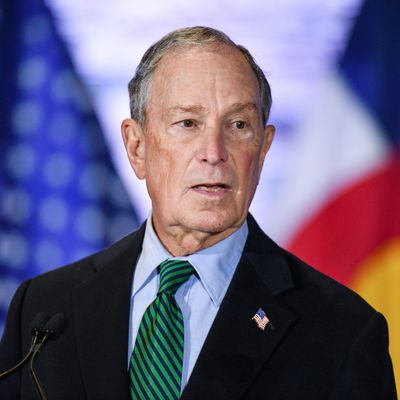
Since Michael Bloomberg entered the 2020 presidential race, I have addressed and largely dismissed two scenarios whereby he might claim the Democratic nomination in Milwaukee next July. The first, raised by The New Republic’s Alex Pareene as something the former mayor and his backers might consider plausible, involved a contested convention turning to him. The second, manufactured by CNBC’s John Ellis, stipulated that someone unelectable (e.g., Pete Buttigieg) might emerge from the early states and leave Democrats with no alternative other than Bloomberg and his insanely deep pockets.
I still see no way Bloomberg wins; this just isn’t a great year, if there ever was one, for an ex-Republican mega-billionaire whose base is Wall Street and who has issues with minority voters. If there’s a “brokered convention” he could be among the least likely of survivors, and it’s hard to imagine him winning one-on-one with anyone else in the primaries. But the more I think about the monstrous amount of money he is willing to spend after the early states are done, there’s definitely a scenario where he is at least relevant.
First of all, it’s important to understand that we’ve never seen anything like the quantity of resources – not just ads, but field staff – Bloomberg is preparing to deploy in the 14 states holding contests on March 3, Super Tuesday, as the Washington Post reports:
Already, there are hundreds of staff members working remotely or out of the temporary campaign headquarters in one of Bloomberg’s Beaux-Arts limestone mansions on the Upper East Side of Manhattan, where the blinds rise and fall with time of day, the food is free and a selection of his museum-quality art collection is on display.
The campaign has been offering field organizers salaries of $6,000 a month, a 70 percent premium from the going rate of $3,500 paid by the campaigns of Sens. Elizabeth Warren (D-Mass.) and Bernie Sanders (I-Vt.)….
The money they have been sending out the door for advertising is record-setting. Since his campaign launch on Nov. 24, Bloomberg has spent or reserved about $60 million in television and radio ads, with no sign of slowing down. Taken together, the top four polling Democrats in the race — former vice president Joe Biden; South Bend, Ind., Mayor Pete Buttigieg; Sanders and Warren — have spent about $28 million on similar ads all year.
He has also purchased $4.6 million of Google ads, from YouTube spots that run alongside video game streamers to classic search promotions. That is more than any other Democratic campaign has spent over the full year, according to the company. On Facebook, his spending over the past week ran at more than $170,000 a day, 2½ times the level of President Trump’s reelection campaign and about three times more than Tom Steyer, the other billionaire Democrat seeking the nomination. All of his digital ads are focused on increasing his support and recruiting staff, rather than the fundraising that occupies other campaigns.
If he keeps this up, the survivors of the early state contests are going to face a juggernaut unlike anything they’ve ever seen. And they could be exhausted financially and even physically at that point.
But here’s the second important point: right now the odds of an early-state knockout for one of the current front-runners are looking low. According to the RealClearPolitics polling averages for Iowa, four candidates are currently above the 15 percent necessary to win statewide delegates (Buttigieg, Sanders, Warren, and Biden). The candidate running fourth in New Hampshire, Joe Biden, is also the candidate most likely to bounce back in his “firewall” states of South Carolina and Nevada, which have the kind of sizable nonwhite voting populations that will help Biden (and for that matter, to some extent, Bernie Sanders).
So the odds of three candidates heading into Super Tuesday ready to divide up votes with Bloomberg could be pretty high. And the former New York mayor could top the 15 percent threshold in states and congressional districts across the vast landscape where he’s going to be placing staff and ads; he also has the money to extend into the other 13 states holding contests later in March. All in all, 38 percent of the convention’s pledged delegates will be chosen on Super Tuesday, and another 27 percent will be awarded the rest of that month. In other words, two-thirds of the total delegates will be up for grabs after the early states soak up the vast majority of the front-runners’ campaign dollars but quite possibly before the field is fully “winnowed.”
Now that’s a scenario where Bloomberg could get enough delegates to make things interesting down the stretch. I still don’t think he can win without some incredible luck. But yes, he could help produce a contested convention (though it would probably turn to someone other than him), or at least force the post-March frontrunner (if there is one) to work hard and perhaps make concessions to nail it all downs.
Bloomberg’s long-time advisor and 2020 campaign manager had an interesting way to put it to the Post:
“The theory of the case is that we are running a national campaign,” said Bloomberg campaign manager Kevin Sheekey. “From my point of view, no one has ever run a national primary campaign since Kennedy in 1960.”
That was a different era, but JFK was indeed a national candidate with the money to pick off potential rivals by beating them on their own turf and adding delegates to his real base among urban political bosses who didn’t have to mess with primaries. Maybe some observers think shadowy financial elites have the same role in the Democratic Party today, but more likely the most important force other than voters in the 2020 nomination contest will be the progressive activists for whom Michael Bloomberg is anathema. Still, he cannot be simply ignored if he keeps spending money like he is right now.






























